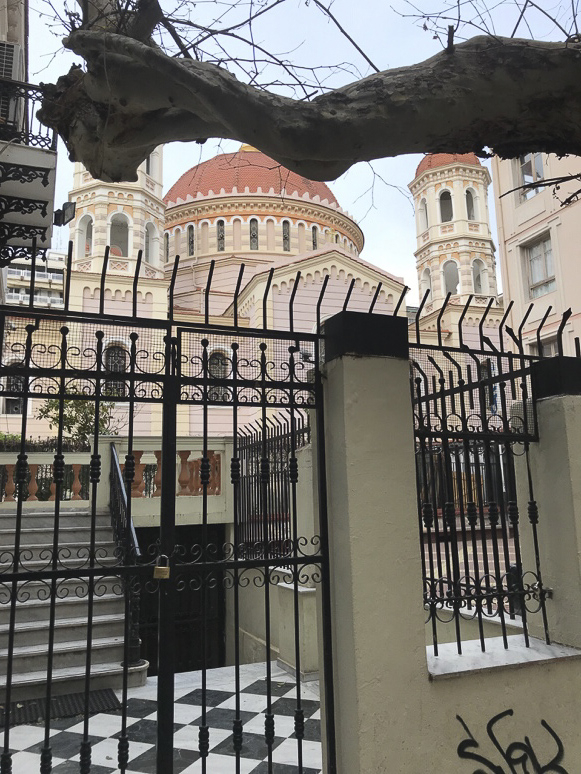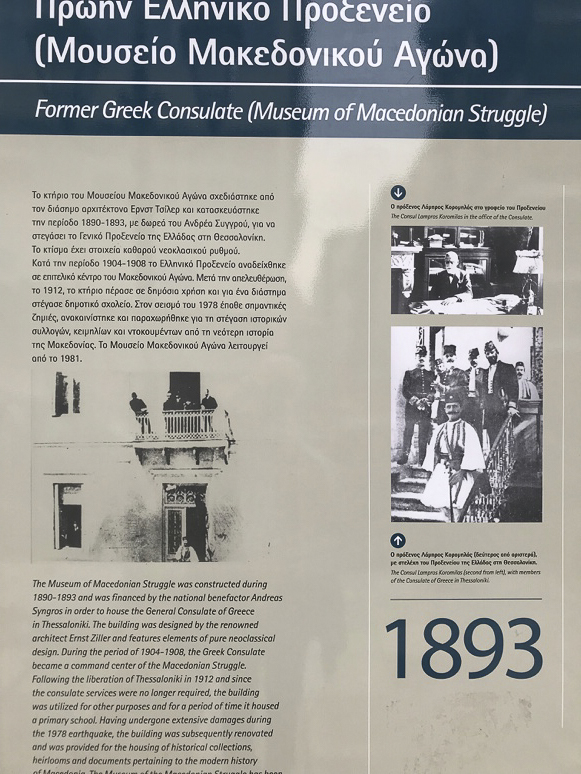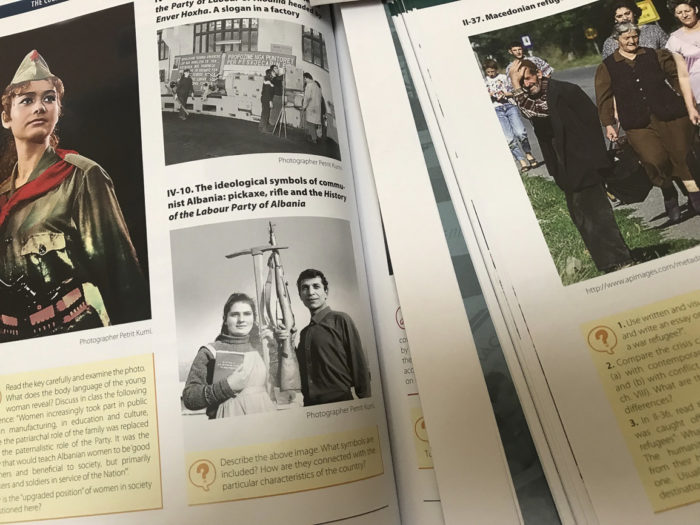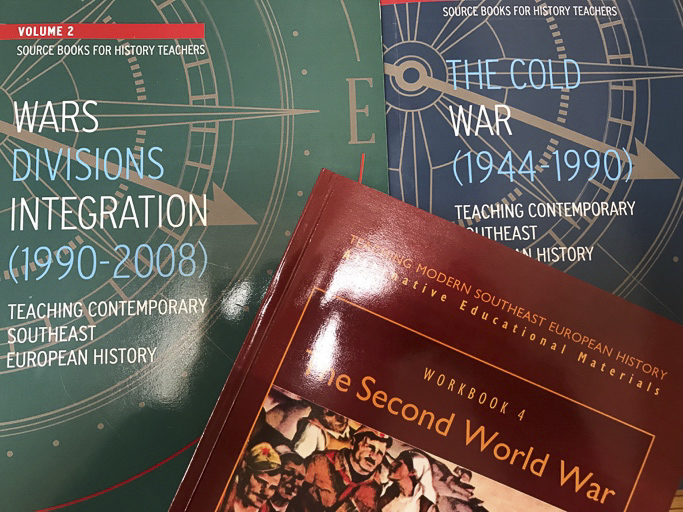RECONCILIATION ON THE BALKAN – A PERMANENT CHALLENGE
Thessaloniki March 2019
Macedonia and North Macedonia
After having been only some weeks ago in the capital of what is now officially called North Macedonia I am in the capital of Macedonia, the Greek province. The PRESPA agreement between the Greek and North Macedonian governments have been signed and ratified. Certainly reconciliation after many years of nationalistic arguments and setting of facts – like the many statutes in Skopje – cannot be declared done and finished. In both countries there are still many people convinced the agreement is one-sided and gives the other side an unequal share of benefits.
Of course, as in all these conflicts it starts with „competitive victimhood“. Every side complains they are the real victims. In this case Greece complained about being threatened by some Greater Macedonia aspirations by the governments in Skopje. Calling themselves Macedonia, the politicians in Macedonia will start to claim Greek territory. And in fact some maps in history books published with government support showed such maps of Greater Macedonia. The fact that the Skopje airport and a highway were named after Alexander the Great and many neo-hellenistic – and by the way very ugly – buildings and statues were deliberately demonstrating the governments intention to define them as successor of Alexander the Great. But Alexander the Great is for the Greek side a Greek hero and no other country can claim ownership on him.
On the Greek side the Macedonians are especially sensitive due to their long struggle against Turkish/Ottoman occupation. This also is the reason why Greek Macedonians feel themselves specially affected by the name issue. They already have been victims of occupation – by the Turkish/Ottoman empire. And although relations with the Turks improved some resentments still remain. And it seems that the the agreement between the Greek and North Macedonian government did not convince all Greeks especially those living in the Macedonian region. Emotions last much longer than rational considerations. Emotions are often deep rooted and last much longer than rational considerations.
Albanian Kosovaars and Serbs
The most controversial issue waiting for reconciliation is certainly the conflict between Kosovo Albanians and Serbs in Kosovo and Serbia. Here again the „competitive victimhood“ plays an important role. The Kosovaars certainly feel themselves victims of long Serb domination. And certainly they had a lot of reasons to complain about discrimination and mistreatment. But that does not mean that the Serb side does not feel to be victim. Famous is the statement produced by many prominent Serb intellectuals, artists and bishops in which they stated: „The history of Serbian lands is full of instances of genocide against Serbs and of exodus to which they were exposed… Processes of annihilation of Serbs in the most diverse and brutal ways have been continuous.“ So in this case again both sides see themselves as victims of even a genocide.
And as Kosovo was created against the will and force of Serbia it is not surprising that there is still animosity and hate against those who tried to prevent Kosovo’s self determination. And things will hardly improve if both sides only see their relation on the basis of being the other victims. In addition, with Russia supporting the Serb side, a country supports it, which sees itself as victim especially of the „West“. This support is also part of orthodox solidarity. Consequently Russia rejects the independence of Kosovo as not compatible with International Law despite its illegal occupation of Crimea.
Joint History Project
Anyway, history was and still is reinterpreted and misused for political purposes. As this was systematically done in the Balkan region – of course not only here – a few very forward looking people especially from Greece founded a Centre For Democracy and Reconciliation in South Eastern Europe (CDRSEE). As seat Thessaloniki was chosen and the elaboration of books in the framework of the Joint History Project (JHP) was started. History was presented not as showing one(!) truth but having a multi-sided dimension or rather dimensions.
In the introduction to the workbook 4 – on the Second World War – the authors who were elaborating the text books under guidance of Christina Koulouri from Athens wrote: „In some (most?) countries of the South-East Europe, history teaching (and consequently history textbooks have this conception) is subsequently based on the ’single truth‘, so it is an exception for students to meet contradictory sources… without a multi-perspective approach there is no real study, understanding and learning of history – or otherwise, it becomes merely data memorization.“ But data memorization leaves ample room for ideological manipulation and identification as the sole victim of history. And these interpretations will be defined as facts and used for political arguments between politicians of different countries but also inside the same country.
But of course to introduce a multi – perspective approach does not mean that „everything is relative“ and one has to accept any kind of truth. It would certainly not offer support and justification for those who would deny the Holocaust. Facts remain facts and that is true also for different discriminations and aggressions perpetrated in the Balkan region. But any multi-perspective approach would recognize different motivations and perpetrators and not allow black outs. It would recognize different victims and victimization. It would also analyze the process of „competitive victimization“ which you could and still can see between Kosovo Albanians and Serbs. But even between some Croats and Serbs this blame game is happening again and again. And Bosnia and Herzegovina is full of such competitive victimhood.
All this underlines the need for reconciliation in the Balkan region. Therefore it is sad, that my last visit to Thessaloniki had the main purpose closing down the CDRSEE as for the moment there is no possibility to find enough financial support for keeping it alive. But in face of the necessities for reconciliation the International Institute for Peace will carry on its already started project with the young of the region which includes also the question of reconciliation. And we will present the newly elected EU Parliament and Commission the work done by the CDRSEE and the “ Towards Alternative Horizon“ project organised by the IIP and other Austrian institutes. We only can hope for a new start of the reconciliation initiatives thereafter.
Brief excursion into the Middle East
I was in Thessaloniki on the day on which exactly 40 years ago, Egyptian President Anwar al-Sadat shook the hand of Israeli Prime-minister Menachem Begin under the auspices of US President Jimmy Carter. It certainly was a clear and important sign of reconciliation. In some way this Reconciliation step lasts until today. Egyptian authorities are again and again negotiating a truce agreement between Israel and Hamas. Even if they are often broken, they build a minimum of a basis of understanding and „dialogue“ between the two enemies.
But overall the relations between Israel and Arabs – inside and outside Israeli – are exemplary for relations of a „competitve victimhood“. Both are victims – alas of a different kind. It is not about comparing and weighting the different victimization. But the Holocaust and the Nakba are both still today used to underline the respective suffering. And especially the Israeli right wing is politicizing the Holocaust permanently.
In a recent book edited by Bashir Bashir and Amos Goldberg, „The Holocaust and Nakba“ this struggle about competitive victimhood is clearly analyzed. In an introduction they write: „Both events, which differ in nature and degree, have had a decisive impact on the subsequent history, consciousness, and identity of the two people. … For the most part, each group sees its own catastrophe as a unique event and seeks to devalue or even deny the catastrophe of the other.“
Every case is a special one. We cannot equate the fate of Jews in the Holocaust with that of the Arabs during Nakba and during occupation. But no peace can be found if the catastrophe felt by the „other“ side is devalued or even denied. The same is true for the conflict between Albanian Kosovaars and Serbs. It is not about comparing or equating. What is needed is mutual recognition of loss and deprivation.
Returning to victimhood and reconciliation in the Balkans
As I said before, emotions have a much stronger influence than rational arguments and that is especially true for emotions in connection with victimhood. Staub and Bar-Tal, two experts on victimhood competition wrote: „Groups encode important experiences, especially extensive suffering, in their collective memory, which can maintain a sense of woundedness and past injustice through generations.“ And politicians are often inclined to remind citizens of „their“ past sufferings in order to keep victimhood alive. And that cannot heal the wounds and promote reconciliation. It rather regenerates hate. So how to come to reconciliation?
Sally Kohn defines in her book „The opposite of hate“ the conditions for reconciliation as follows: „Ultimately the opposite of hate is the beautiful and powerful reality of how we are all fundamentally linked and equal as human beings. The opposite of hate is connection.“ And in fact connection – human connection – always reducers hate and animosity. It is not enough to build roads and promote trade and to promote the economic connectivity. Human contacts are needed to learn to live close to each other and finally with each other. Still then the relations may be fragile. We know it from Nazis enhancing hate against Jews and we know it rather recently from the cruel civil war and genocide inside Ruanda. But also the „Yugoslav Wars‘ demonstrated that connection and neighborhood are no guarantee against a breakdown of civil behavior.
In all these cases politicians promoted the image of victimhood and asked for „self-defence“ against the class, race or ethnie which they defined as perpetrators. Being a victim justifies in extremism killing your neighbor. Therefore a continuous questioning of these one-sided victimhood perception is necessary. Each generation has to learn again to be vigilant against what the foreign minister of North Macedonia defined as Ethno-Mythology when we met him at our visit to Skopje. History in form of tales and traditional stories or inside history books, which are repeating this picture of being an innocent victim are preparing the ground for renewed attack on neighbors including neighboring countries. Therefore history teaching can and must – in introducing a multi-perspective approach – lay the ground for reconciliation with the younger generation.
In a book, which I could edit together with my colleague Jan Marinus Wiersma, “ Politics of the Past: The Use and Abuse of History we made also an interview with the famous British historian, Norman Davies. He said to us: “ Full objectivity is impossible. We must strive to objectivity, but we can never quite get there. However, a historian should try to be impartial and should try and look at every event from different points of view. The best chances of getting near the truth, is to construct different perspectives before making a judgment. A historian has a duty to make a judgement, but also to state clearly “this is my opinion and this evidence I put before you”. In other words historians should separate judgement from evidence”
Of course the multi-perspective approach in history teaching is only the basis for developing empathy without which reconciliation is not possible. Empathy itself supposes what can be called a disruption and unsettlement of one-sided victimhood. Bashir and Goldberg write in the afore mentioned preface to “The Holocaust and the Nakba”: ”As such empathic unsettlement disrupts and constantly undermines every “redeeming narrative” of suffering that offers a melancholic pleasure, and this is the source of its considerable value. One might say that it compels us to take the otherness of the other seriously.” To take the “otherness of the other seriously” is not only vital for finding peace in the Middle East. It would be important to bring peace and acceptance into the relations between Kosovaars Albanians and Serbs. And in addition it would be the basis for accepting and including migrants especially from other continents in our European societies.




